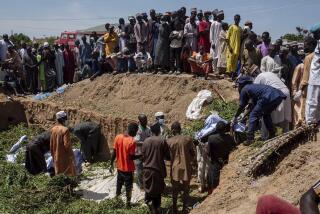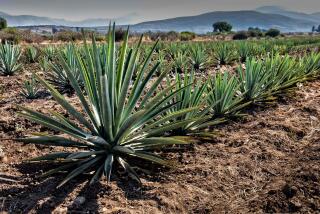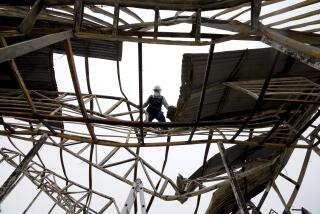Blaze Kills 256 in Paraguay
ASUNCION, Paraguay — At least 256 people were killed after a propane gas tank exploded inside a crowded supermarket here, igniting a fast-moving fire that left a crowd of Sunday shoppers trapped behind doors that may have been locked to prevent looting.
Witnesses said the explosion occurred about noon in a basement food-court kitchen where families had gathered for lunch in the modern, mall-sized market.
Officials said many bodies had yet to be recovered and the death toll could surpass 300, making the blaze among the deadliest in recent South American history. Public Health Minister Julio Cesar Velazquez described a gruesome scene at the Ycua Bolanos supermarket and a temporary morgue set up nearby.
“I saw children, pregnant women, senior citizens and young people,” Velazquez said. “It’s horrific.”
Officials said rescue efforts were being hampered by fears that the building, which occupies much of a city block, might collapse. Thick plumes of smoke rose from the roof for hours after the last survivor was rescued.
Local television network Telefuturo reported that after some shoppers on the floors above the fire took advantage of the initial confusion to steal, one or several managers or security guards sealed some exits.
Julio Gimenez, an attorney for the market’s owners, denied that such actions were taken. “Nothing was closed,” Gimenez said. “Everyone who could escape this unfortunate event did.”
But witnesses described neighbors scrambling to break open locked doors to allow those inside to escape.
“A group of us went to break all these windows with rocks,” one man told Telefuturo, pointing to a series of street-level glass doors pocked with holes. “We got a lot of people out that way.”
Rodolfo Rodriguez, a cameraman for Channel 13, arrived just as the first fire crews did. “I could see people on the floor who were already asphyxiated and burned,” he said. “They were being stepped on by the people trying to get away.”
Daniel Paiva, one of the owners of the complex, spoke to television reporters moments after escaping the burning building. “It was so fast,” he said. “Everything happened in a few minutes.”
Paiva too denied that any doors were locked. Later Sunday, Paraguayan authorities detained him to investigate charges of “culpable homicide.” Authorities would not reveal where he was being held because they feared he might be attacked by relatives of the victims.
Asuncion’s fire department -- composed of volunteers, like most in South America -- seemed ill-prepared for the magnitude of the blaze. Paraguayan media made a public call for donations of medical supplies and said cellphones were needed to help coordinate the effort.
U.S. Embassy officials brought a generator to the scene as darkness fell Sunday.
Firefighters took many of the dead to a temporary morgue at a nearby nightclub, where reporters counted 111 bodies lined up in a parking lot Sunday afternoon, many burned beyond recognition. The dead included a 3-month-old child.
Dozen of bodies were clustered in the basement food court, officials said. Emerging from the building nine hours after the blaze was reported, firefighter Jose Antonio Recalde said he and his colleagues had seen as many as 100 bodies there.
Survivors told Recalde they ran through the complex searching for a way out. Some knocked down the market’s brick walls.
His face and uniform covered with soot, Recalde described the scene inside the building as gloomy and frightening.
Officials said at least one of the upper floors in the three-story building had collapsed in the fire, trapping and killing many people underneath.
Paraguayan television broadcast images of soot-covered survivors being rushed from the building and passersby splashing their faces with water. Hours later, the scene was one of chaos, with rescue workers, doctors, police and family members all trying to press closer to the building.
Among the officials arriving was Paraguay’s president, Nicanor Duarte Frutos.
“At this moment of great pain, I came to tend to the wounded and the families of the dead,” Duarte Frutos said.
*
Times staff writer Tobar reported from Buenos Aires and special correspondent Paredes from Asuncion.
More to Read
Sign up for Essential California
The most important California stories and recommendations in your inbox every morning.
You may occasionally receive promotional content from the Los Angeles Times.











